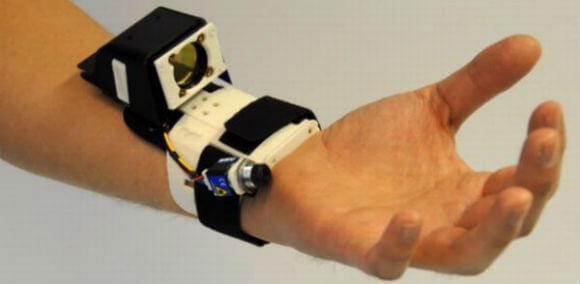Microsoft developers in the UK working with researchers from Newcastle University have recently announced an intriguing project: a wrist strap sensor that tracks finger motions in real time. Appropriately called Digits, the wireless system allows wearers to control computers remotely by recognition of individual finger movement and orientation using an infrared camera and an inertial measurement unit. That means not only the orientation of the wrist but the angles of each finger can be used for gesture control.
Because its a wireless wrist worn device rather than a glove, users could interact with electronic devices without being physically connected to them and have their hands free for non-computer related activities. The Digits prototype was demoed at the Computing Machinery Symposium on User Interface Software and Technology (ACM UIST 2012).
A video about the project shows how gesture control with the device works:
The press release for the device reveals that researchers are looking at gesture control as a way to interact with electronic devices without the need to physically touch them. One of the PhD students working on the project asked, “Can you imagine how much easier it would be if you could answer your mobile phone while it’s still in your pocket or buried at the bottom of your bag?”
Clearly, the tech would need to be miniaturized down to the size of a wristwatch to be useable. It could also be useful as a complement to voice recognition software like Siri and Evi and voice-driven Google Search in ways that could make interacting with computers much more akin to interacting with humans, that is, through verbal and nonverbal communication.
The latest work is part of a growing trend: hardware developers are hellbent on revolutionizing input devices.
When Microsoft introduced Kinect a few years ago, it opened up the possibilities of wireless body tracking for application use. Last spring, one of the biggest steps toward wireless gesture control was introduced by Leap Motion, which is a highly precise and inexpensive 3D finger tracker that the developers proposed would replace the keyboard and mouse.
On a related front, researchers are pushing hard on the development of smart gloves for user interfaces, such as the one made famous by the film Minority Report. These gloves could replace a mouse altogether and could be configured for very specific applications as well. For instance, an innovation team called Med Sensation that emerged from this year’s Graduate Studies Program at Singularity University is developing a Tricorder-like glove for medical examinations.
The Digits project joins these approaches and others that are part of a larger movement towards wearable computing, and odds are devices will start to hit the market next year. How quickly they will be adopted and which ones will ultimately prove to be the most useful is still up for grabs.
In light of all the competition in this space, the Digits prototype has a long way to go, and even if optimized, might not find broad utility. Still, it shows where gesture recognition technology is headed, suggesting that in the years ahead we may control electronic devices with a simple flick of a finger rather than a click of a button.




